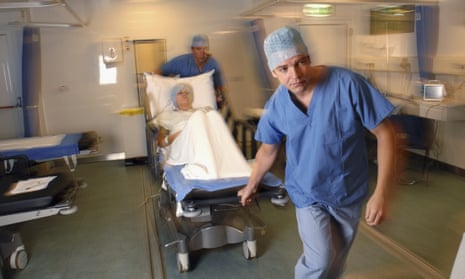One in seven NHS hospital operations are being cancelled just before they are due to take place, often because of a lack of beds, staff or operating theatres, research reveals.
Of 26,171 procedures due to take place during the last week of March this year, 3,724 (14%) of them were called off at or close to the time they were due to occur, according to the findings, which are based on the experience of patients at 90% of NHS hospitals across the UK.
The results prompted fresh warnings that the delays were leading to patients suffering pain and distress when they had to wait longer than expected for their surgery and that the NHS was seriously short of the resources it needed to function properly.
The study, published on Friday in the British Journal of Anaesthesia, also disclosed that patients were often denied surgery at the last moment because others who have come in to the hospital through A&E were judged to be in more urgent medical need.
An acute lack of beds in high-dependency and intensive care units contributes to cancellations. Patients who will need to spend time in either type of facility after their surgery, because they will need extra medical support as they recover, are three times more likely to experience their operation being cancelled than other groups awaiting surgery, the study found.
The authors, experts from the Royal College of Anaesthetists and the clinical outcomes centre at University College London, say the findings give the most in-depth picture yet as to why so many operations are postponed late in the day, which they say is an NHS-wide “intractable problem”.
“Last-minute cancellations of surgery affect the health and welfare of tens of thousands of patients in the UK every year,” said Prof Ramani Moonesinghe, the chief investigator of the SNAP-2: EPICCS project, which undertook the research.
“It is clear that capacity issues, in particular resulting from competition for inpatient beds with emergency admissions, and the requirement for critical care after high-risk surgery, substantially influence the risk of last-minute surgical cancellation,” she added.
One in 10 patients going to hospital for a planned, non-urgent operation had already had their procedure cancelled at least once before, the researchers found. During the last week of March 1,499 (10%) of the 14,936 patients who were due to have planned surgery were in that position.
While a third (499) of those 1,499 cancellations were caused by medical issues, the other two-thirds (1,000) happened for non-clinical reasons. Of those, 31% were due to a lack of beds, 12.7% to a shortage of operating theatre capacity, 2.3% to equipment problems and 2.2% due to staff being unavailable. Only 2.4% were for personal reasons and 0.5% because the patient did not attend.
NHS England disputed the figures. A spokesman said: “Actually, only a tiny minority of operations – just one in one hundred – is cancelled on the day, and this report provides only a selective, limited snapshot … the NHS is funding more routine operations and more people are undergoing treatment than the year before.”
Moonesinghe said her team had looked at operations cancelled for any reason, not just non-clinical reasons, and had also looked only at surgery that involved a spell in hospital rather than more minor procedures, in which patients often go home the same day.
